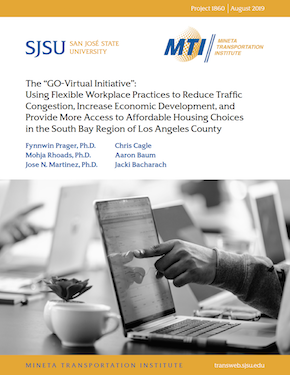- 408-924-7560
- mineta-institute@sjsu.edu
- Donate
The “GO-Virtual Initiative”: Using Flexible Workplace Practices to Reduce Traffic Congestion, Increase Economic Development, and Provide More Access to Affordable Housing Choices in the South Bay Region of Los Angeles County
Flexible workplace practices (FWPs) such as telework, flexible scheduling, and the use of co-working spaces have the potential to address problems of congestion, pollution and lack of housing affordability in the South Bay region of Los Angeles County. However, trends in the adoption of FWPs—especially of working from home—across the region do not appear to be increasing as much as expected, despite advances in technology, changing worker demands, and evolving workplace cultures. In the South Bay and Los Angeles, commute times and the proportion of residents driving alone to work have increased as the economy has grown. As alternatives to driving alone to work, employees appear to face the choices of using public transit if more accessible, or carpooling if the journey is longer; however, both of these modes of transportation have declined in usage in recent years. Instead, the only alternative to driving alone that has increased in frequency in the South Bay and Los Angeles County in recent years is working from home, which is most likely concentrated among residents in locations with higher education levels or occupations that are more appropriate. Prior literature has provided numerous insights here, finding that conditions are region-specific, and that occupational and industry constraints combine with manager resistance and employee concerns over work-life balance to limit the expansion of FWP. The authors of this study contribute to the literature by focusing on the obstacles to expansion of FWP among South Bay organizations, as well as by comparing the projected impacts of potential government interventions in this space. The authors explore these issues with methods innovative to the field, including a combination of surveys and expert elicitation focus groups that includes a numerous types of FWP, especially the inclusion of co-working spaces as a strategy. Participants in the survey and focus groups perceived the major obstacles to expansion to be a combination of managerial and executive resistance, alongside occupational constraints. Participants perceived government subsidies and incentives as both having a good combination of costs and impacts, possibly to be used to encourage the use of private co-working spaces, which offer a market solution that balances the benefits of traditional at-home telework and collaborative workplaces. That said, telework remains a cost-effective approach to reducing commute-related emissions, and hence more aggressive programs, such as telework facilities exchanges, expansion of South Coast Air Quality Management District mandates, and incentives for workforce training and program implementation may be needed to achieve broader climate action and local pollution targets.
FYNNWIN PRAGER, PhD
Dr. Fynnwin Prager is Assistant Professor of Public Administration at California State University, Dominguez Hills, where he is Co-Director of the South Bay Economics Institute. Dr. Prager received his PhD in Policy, Planning and Development from the University of Southern California, and undertook a post-doctoral appointment at the Center for Risk and Economic Analysis of Terrorism Events.
MOHJA RHOADS, PhD
Dr. Rhoads has spent over 10 years studying FWP and has published several articles and a dissertation on the subject. Dr. Rhoads has also worked with the SBCCOG for over 10 years on two major electric vehicle studies from which she has built a substantial database of over 20,000 trips originating in the South Bay. While a fellow at USC, Dr. Rhoads worked on a Big Data Transportation Archive of with the USC departments of Urban Planning and Computer Science and the Los Angeles Metropolitan Transportation Authority (LA Metro).
JOSE N. MARTINEZ, PhD
Dr. Martinez’s academic research and interests relate to international migration, labor informality, econometrics, and time series forecasting. Dr. Martinez has expertise on the South Bay economy through his role of Co-Director of the South Bay Economics Institute at CSUDH, the CSUDH Economic Forecast, and projects and presentations with Los Angeles Economic Development Corporation, World Trade Center Los Angeles, and the SBCCOG.
CHRIS CAGLE
Chris Cagle is the Regional Affairs Manager for the SBWIB and also serves as the organization’s Marketing Director. Additionally, his duties include grant writing, program design and apprenticeship development. Chris has designed an apprenticeship model for engineering as part of a team that became the first to successfully register an Aerospace Engineering Apprenticeship occupation in the United States with the US Department of Labor. He also established an on-line business portal for the region, SouthBayBusiness. org, which provides user-friendly profiles of each city in the South Bay area.
AARON BAUM
Aaron Baum is an Environmental Analyst at the South Bay Cities Council of Governments, specializing in Transportation and Mobility issues. His responsibilities have included the project management of the SBCCOG’s Neighborhood Electric Vehicle and full-sized Battery Electric Vehicle studies. Aaron manages the Metropolitan Transit Agency’s transportation demand management (TDM) outreach and program efforts in the South Bay.
JACKI BACHARACH
Jacki Bacharach has served as Executive Director of the SBCCOG since 1998. Her duties include program and project management and grant administration—including oversight responsibility for the South Bay Environmental Services Center and the South Bay’s $906 million Measure R Highway program—policy development, city outreach, and working with state and regional agencies on behalf of the sub-region.
-
Contact Us
San José State University One Washington Square, San Jose, CA 95192 Phone: 408-924-7560 Email: mineta-institute@sjsu.edu






